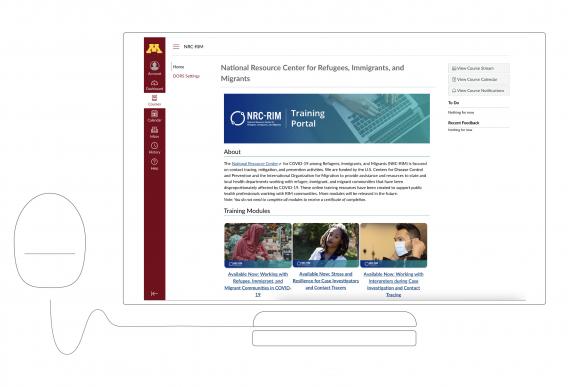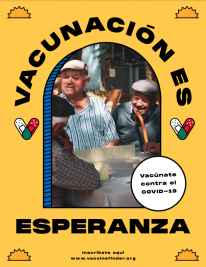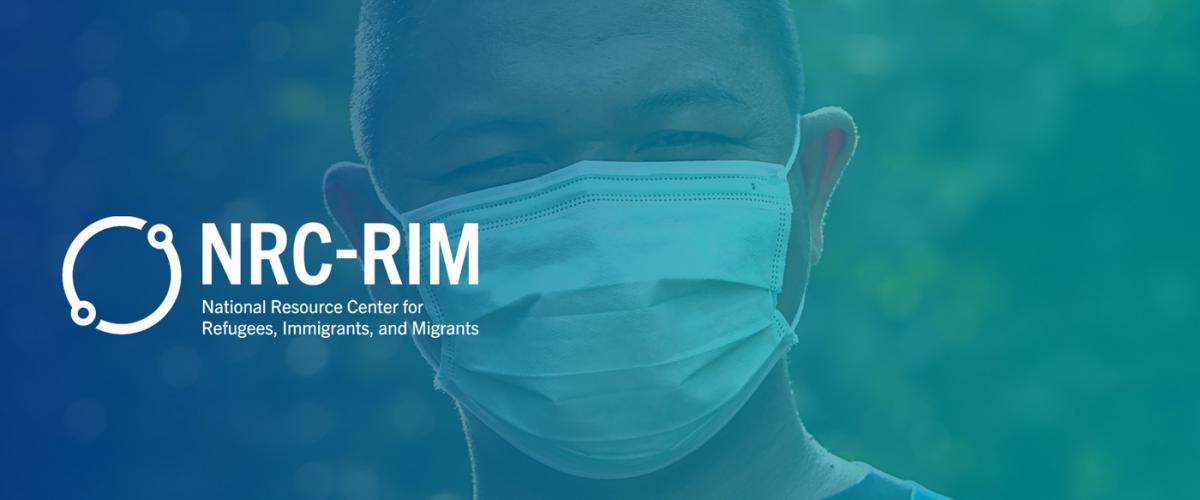Early Successes of the National Resource Center for Refugees, Immigrants, and Migrants
While COVID-19 is a public health threat to the entire US population, growing evidence shows that it disproportionately affects some people, including refugees, immigrants, and migrants (RIM). These strong, resilient people and communities are an integral part of the nation’s social, cultural, and economic vitality, and preventing the spread of COVID-19 in RIM communities is both a health equity and an economic concern.
In response, the National Resource Center for Refugees, Immigrants, and Migrants (NRC-RIM) was created in 2020. Housed in the Center for Global Health and Social Responsibility (CGHSR), NRC-RIM’s goal is to support state and local health departments and other public health organizations in their work with RIM communities. The project is supported with funding from the U.S. Centers for Disease Control and Prevention and the United Nations International Organization for Migration, and is led by PI Bill Stauffer, MD, professor in the Medical School and Director of Human Migration and Health at CGHSR, and Co-PIs Shailey Prasad, MD, MPH, executive director of CGHSR, and Erin Mann, MPH, global collaborations coordinator with CGHSR.
In its first six months, NRC-RIM has developed initiatives supporting COVID-19 mitigation, prevention, and control measures including case investigation and contact tracing, vaccinations, and fact-based education. Throughout their work, the team at NRC-RIM prioritizes creating linguistically- and culturally-appropriate health communications and health education, working closely with local community members, grassroots organizations, and other community groups.
Successes and Impacts
Looking back at the first six months of the project, NRC-RIM has made a significant positive impact with its resources and materials. Hundreds of professionals and practitioners have been reached in online training, webinars, in-depth interviews, and information campaigns.
Online training

Accessible via online modules in the Canvas platform, training content is available free of charge and open to all. Training prioritizes interactive activities and includes discussion boards to support conversation and collaboration between public health professionals.
Throughout the training modules, 91% of participants have a demonstrated increase in their knowledge on course topics. In addition, 100% of participants plan to apply what they learned in their future work. To date, NRC-RIM has four modules, including:
- Working with Refugee, Immigrant, and Migrant Communities in COVID-19
- Working with Interpreters during Case Investigation and Contact Tracing
- Stress and Resilience for Case Investigators and Contact Tracers
- A Facilitator's Guide for Conducting Listening Sessions
Said one training participant of the Stress and Resilience module, “This is a great module. I wish we had this as a training from when there were the first couple of waves of many many cases. It would have been helpful to know that other people were also stressed at the high number of caseloads… I also enjoyed how different each of the workers’ perspectives, stressors, and advice was.”
Best and promising practices
As the COVID-19 pandemic shifts and evolves, state and local health departments have had to nimbly adapt to update their policies, guidelines, and practices based on the most current scientific knowledge. NRC-RIM works to compile those best and promising practices that are effective for health organizations in a library of locally-inspired models and ideas.
To date, 38 best & promising practices and 27 checklists and guides are available on the NRC-RIM website, and the team has conducted 58 interviews with public health professionals, healthcare providers, and community members to develop these practices. Highly popular practices include:
- Vaccine campaign partnerships with faith-based organizations
- Bringing COVID-19 testing services directly to communities
- Convenient vaccine access for communities
Health education and communications resources
NRC-RIM’s resource library is designed to provide materials for state and local health departments, community organizations, and individuals to use in sharing COVID-19 information with RIM communities.

The growing library includes campaigns, guides and checklists, videos, and a translated materials library, which features over 5,000 resources in more than 175 languages.
The NRC-RIM website also hosts 4 communications campaigns for community members to develop their own communications materials:
- Case investigation and contact tracing campaigns
- Get Vaccinated campaign
- Get The Facts campaign
- “Vaccination Is” campaign
Looking ahead
As a project within the University of Minnesota, NRC-RIM benefits from a vast network of expertise to maximize the impact of their work. In the next six months, NRC-RIM will prioritize dissemination of their robust suite of resources and materials through well-established partnerships.
"We are optimistic that our resources will have a lasting impact beyond COVID-19,” says Mann. “Many of the approaches and models identified by NRC-RIM can be used to continue to promote health equity beyond the pandemic."
To keep up to date with NRC-RIM or access their free resources, visit the center’s website and sign up for their newsletter.
This story was adapted from work by Ian Allen, Syreeta Wilkins, Erin Mann, and Anna Pendleton.
